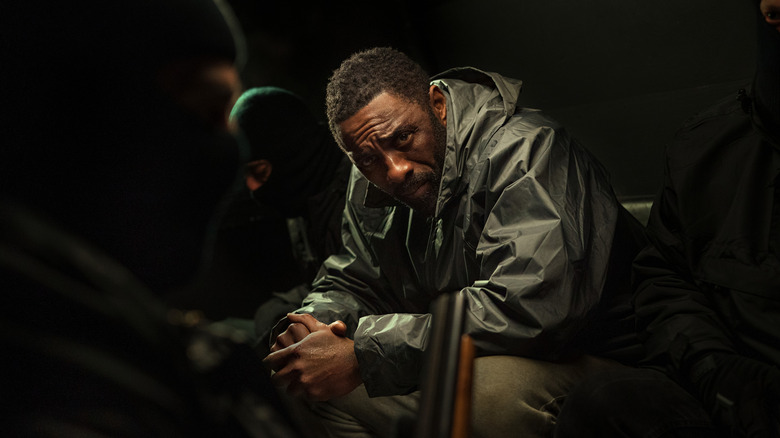Luther: The Fallen Sun's First Script Was So Dark That Andy Serkis Had Doubts Signing On
Detective shows see their characters investigate a wide variety of crimes, from non-violent, like arson, to incredibly violent, like murder. One thing they all have in common is that they deal with the darkest corners of the human soul. One that excels at this particular theme is BBC's "Luther." Starring actor and musician Idris Elba, "Luther" looks at the worst that humankind has to offer. Of course, the criminals that Luther chases aren't the only dark characters — he himself may be the darkest soul out there.
Elba spoke to The Scotsman about what it is like to play the character. "Luther is very hard to play, and hard to be in," the actor revealed. "It's a very dark show, and it isn't easy, but it's part of my job. I always go to Luther when I'm at my grumpiest. It's like, 'I feel s***; let's do some 'Luther.' Because if I do it when I'm happy, it'll drag me down," he reveals. "Actually, I use Luther as a therapy session because there's a lot of screaming and shouting. 'That was really good acting,' people will say, but I wasn't acting; I was really angry. It is definitely therapy for me."
Elba isn't the only one who thinks the series is incredibly dark. Andy Serkis, who has landed the role of primary villain in Netflix's film, "Luther: The Fallen Sun," set for release in March 2023, confesses that he almost passed on the part for that very reason.
The script was almost too dark for him
Wealth and power combined with a highly devious nature create a formidable villain that can get the better of any detective. The little information we have about Serkis' character reveals that he plays a man named David Robey, a millionaire that uses high-tech, big brother-type methods to spy on his victims. In a recent issue of Total Film (via Games Radar), Netflix released a new image that sees Serkis standing in a high-rise apartment overlooking a cityscape. The entire image screams money and power. While the character fits right in with the theme of "Luther," it took some consideration for Serkis to sign on.
When speaking to Total Film (via GamesRadar), the actor revealed that he nearly passed on the role. "When I first read the script, I almost wanted to throw it in the bin and have a shower," Serkis said. "I don't think I've come across anything quite as dark for a long time. And I thought: 'In fact, do I really actually, at this point in the world and time and my life, want to go down this particular rabbit hole of something that's so hard to fathom in humanity?'"
Serkis certainly has the chops to fill the role, having played dark characters in other projects, like Gollum in "The Lord of the Rings" and Supreme Leader Snoke in "Star Wars" who both flirted with the dark side.
Human darkness is Luther's theme
Speaking to Variety ahead of the Season 5 premiere in 2018, Elba admitted that the series' dark nature is why fans didn't get new installments every year. "It's one of those shows that needs to be made into bite sizes because it is very dark, and I think for Neil Cross', the producers', and my sanity, I don't think we can do this the whole time," he said. "I think we like it that way, personally, and the audience and the fans have grown to know it doesn't come every year and that we do it slightly differently."
But the true villain in the series may not be the criminals that Luther chases, but the darkness within him that he flees. Throughout all five seasons, he is accompanied by the sinister and brilliant Alice Morgan (Ruth Wilson), a person he knows who killed her parents. She constantly taunts him and attempts to lure him to the dark side of his soul. She knows he has it in him, and she knows that if she entices him enough, he could give in to it.
While "Luther" is a show about a cop fighting the darkness in the world, it is perhaps more about a detective fighting the darkness within him. After five seasons of this theme, the move to the big screen could offer a storyline that goes even deeper. That thought makes Serkis' hesitation completely understandable.


